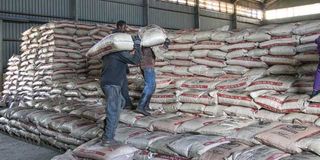Premium
Customised fertiliser vital for national food security

Workers arrange fertiliser at an NCPB depot. To address the fertiliser constraints, we must get enough quantities of the commodity with the right nutrient value, especially targeting small-scale farmers.
Humankind has always deployed various strategies to grow more food to feed an ever-expanding human population.
As early as 8,000 years ago, farmers were allegedly using manure, an organic form of fertiliser, to enrich the soil for cultivation.
But modern fertilisers are relatively recent, dating to 1905, when somebody discovered that nitrogen in the air could be converted into a form that plants could absorb through the soil.
Fertiliser is an essential input in food production and soil productivity, with different types developed. As a resource, the land is limited, hence the need to boost food production. Essentially, fertilisers work by replacing lost nutrients in the soil.
The World Bank says more than half of what we eat is produced using mineral fertilisers containing nitrogen, phosphorus and potassium (NPK).
The global food systems are heavily dependent on fertilisers and so any sudden supply disruptions can have severe implications on food security.
The prevailing global food scarcity is linked to a fertiliser shortage emanating from Covid-19-related supply shocks, worsened by the Russian invasion of Ukraine and the recent surge in petroleum prices, as well as an unprecedented climate crisis. Food systems cannot produce more food to meet the exponential growth in demand and consumption.
Innovative solutions for sustainable crop production are required. Customised fertiliser contains macro- and micronutrients, hence balanced crop nutrition is vital to sustainable agricultural ecosystems. Kenya is among the countries that have embraced customised fertiliser. But soil nutrient imbalance is a challenge for small-scale farmers, who account for over 75 per cent of Kenya’s agricultural output.
Soil surveys by the Kalro in some counties some years back revealed a form of crop nutrient deficiency, blamed on inefficient and indiscriminate fertiliser use. An Agriculture ministry presentation at a recent stakeholders’ conference shows the current crop yields can be significantly improved by resolving the problem of imbalanced fertilisers.
Maximise crop yields
Multi-nutrient fertiliser helps to maximise crop yields by providing a wide range of essential plant nutrients, thus improving soil productivity.
Secondly, combining macro- and micronutrients reduces costs as it’s not necessary to source for the missing nutrients. Thirdly, preventing soil nutrient deficiency averts destructive indiscriminate fertiliser use.
Improved crop productivity catalyses smallholder farmers’ socioeconomic empowerment and drives the shift from subsistence farming to more productive agriculture for food and nutrition security. This can be achieved through access to the right fertiliser at the right time, place and quantities.
To address the fertiliser constraints, we must get enough quantities of the commodity with the right nutrient value, especially targeting small-scale farmers. The government’s move to scale up customised fertiliser use is, therefore, a decisive step towards achieving food and nutrition security.
Ms Thuranira is the country manager for OCP Kenya. [email protected].




